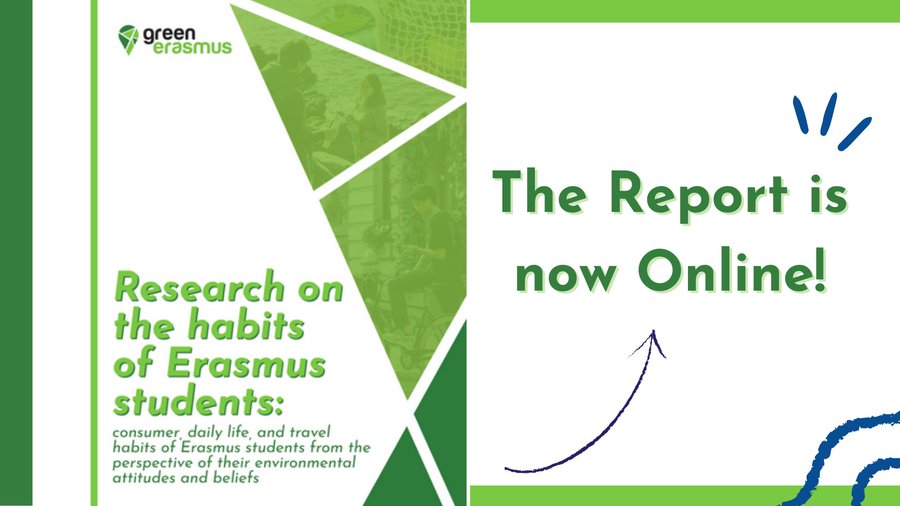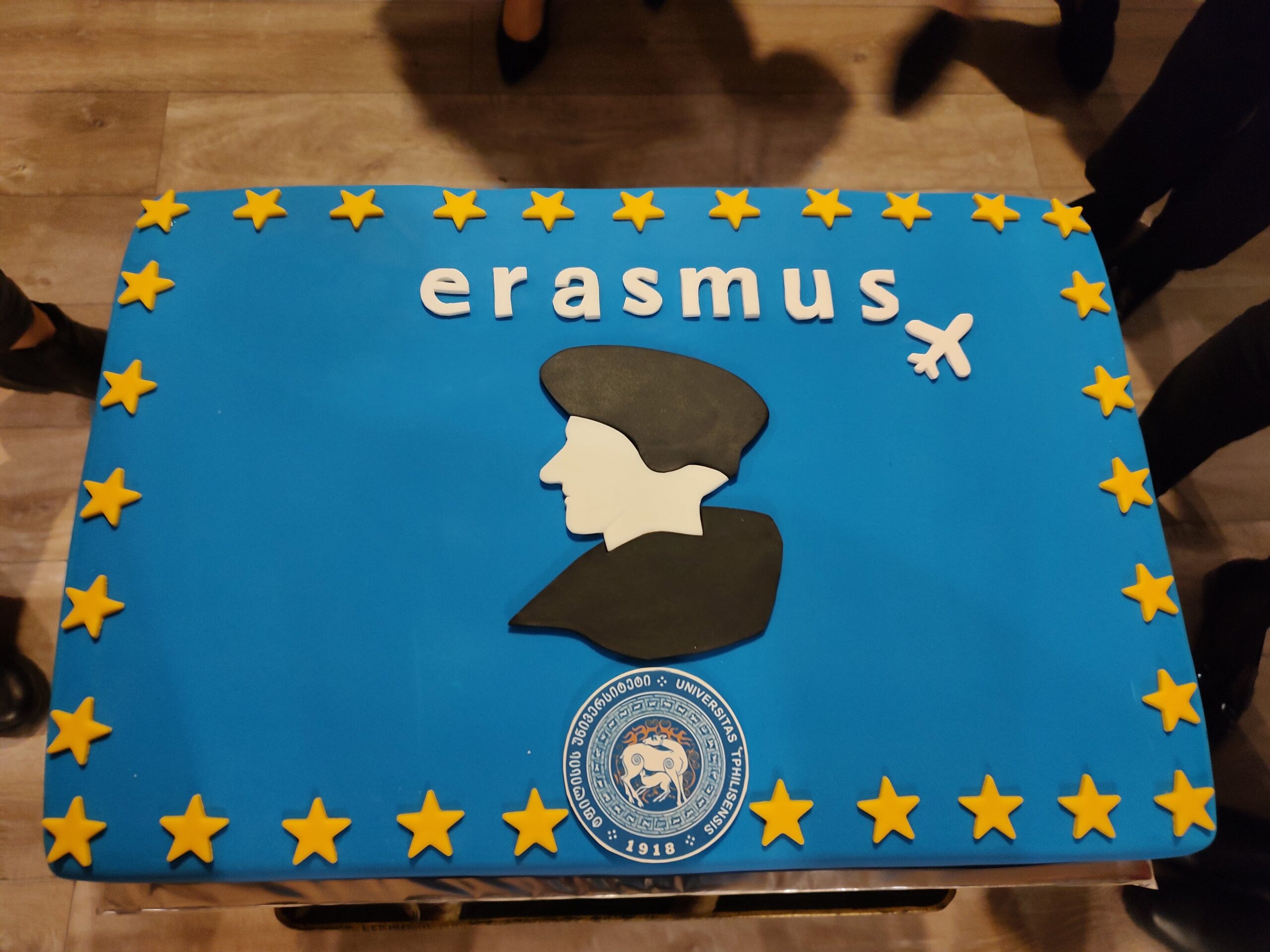During an online event on February 3rd, 2022, the Green Erasmus project and researchers showcased their first reports of the survey which was answered by nearly 8000 students either on mobility or that had been on mobility in the past 3 years. The event was attended by more than 300 people, in its majority university staff, education policymakers across Europe and students who recently took part in a mobility programme.
With students’ mobility rapidly growing in the last few decades and contributing to internationalisation’s carbon footprint it’s pertinent to wonder about the environmental impact of Erasmus mobility.
Since so far research on the environmental impact of student mobility has been limited, the Green Erasmus research aims at comparing students’ consumer behaviour, travel behaviour and daily life habits at home and during mobility. The research also investigates students’ behaviour in relation to socio-psychological factors, such as beliefs, attitudes, norms, awareness levels and other external barriers that impact certain behaviours.
You can read the full report here. If you would like to watch the entire webinar, the video is available at the end of the article.
The Green Erasmus Project is coordinated by a consortium consisting of Erasmus Student Network (ESN), European University Foundation (EUF), European Students’ Union (ESU), Université libre de Bruxelles (ULB), Technische Hochschule Köln (TH Köln), and Students Organising for Sustainability UK (SOS UK).
The main objectives of the project are to reduce the negative impact of the Erasmus+ Programme on environmental sustainability; raise awareness across the European higher education sector about the importance of sustainable internationalisation and finally to empower student organisations to be the agents of change, pushing for improvements on the topic of environmental sustainability.
Green Erasmus also aims to create a holistic approach to aligning internationalisation with sustainability through a handbook, toolkits and activities for sustainable practices by and for students.

THE SURVEY
The event consisted of the presentation of two reports: the first conducted by Georgios Karaiskos, Researcher at the Université Libre de Bruxelles (ULB) which developed a study comparing students’ consumer and travel behaviour and also daily life habits whilst at home and during their mobility; the latter, presented by Helena Alves, Policy and Research Officer at European University Foundation (EUF) investigated which good practices can Higher Education Institutions do to support international and local students in adopting more environmentally sustainable behaviours. Lastly, the event ended with a discussion between the panellists and the audience on the different measures to make Erasmus greener on all levels.
Through the survey conducted, the objective was to understand the travel habits of students, if their ecological footprint had changed in any way and what their consumer habits were, comparing the students while at home and while on mobility.
The key findings presented by the researchers showed that most students are very concerned about climate change (93.8%) and eight out of ten said that they are willing to take responsibility and action towards climate change, since they consider themselves accountable for climate change as well, not only third parties.
However, an attitude-behaviour gap was perceptible: students on mobility pay much more attention to the price of a product (59.6%) than the origin (4.8%) or package reusability (1.8%) when buying, regardless of the fact that more than 9 out of 10 report to be at least fairly concerned about the environment.
Most of the students are informed and their sources are mostly the internet (86.5%) and social media (59.2%). Official sources such as Higher Education Institutions (35.5%) are not as popular. However, 7 out of 10 students want to learn more from their HEIs and are eager to see them more engaged in this topic.
In regards to HEIs, these have expressed a will to promote environmental sustainability.
The study was able to gather some of the good practises HEIs have implemented such as paying grants to students that use eco-friendly means of transport, making staff responsible for sustainability, and organising events that are eco-responsible and creating projects for local and mobile students, perpetuating knowledge and action in this topic.
However, some barriers were also made significant such as the difficulty in changing mindsets and habits; the need for better understanding and belief in sustainability; the lack of resources and time and even physical barriers such as outdated devices and buildings.
Please find more on ESN : https://www.esn.org/news/research-launch-green-erasmus










Green Erasmus is a response to negative changes in our environment.
Perhaps we will recognize that this is a small initiative, but if we combine it with a global effort of states, institutions, schools, ordinary people, etc., we can say with a high degree of probability that life in our beloved land will be slightly better.
Let’s keep our fingers crossed!
Dear Krystian,
Thank you for your comment!
It is remarkable that most of the students according the Survey, are aware about the climate change, thus their habits, behaviours etc are adopted accordingly. Moreover, it is considerable that EU give the opportunity to all the EU citizens to express their opinion and contribute with their initiatives in order to re-shape the future of EU, by listening the voice of EU citzens through the COFOE( Conference of Future of Future) platform.
I believe that a more Green EU Future, is not that far!
Hi,
I appreciate such an iniative against climate change and I think Green Erasmus is a good response against it.
We need to absolutely raise awareness and collaborate to improve together !
seo companies nyc
veusebxen wrjuw sfijkec pfnp buhdujcnlzvnufx
… [Trackback]
[…] Read More here on that Topic: ripec-project.eu/discussion/research-on-the-habits-of-erasmus-students-the-launch-of-the-green-erasmus-survey-report/ […]
… [Trackback]
[…] Find More to that Topic: ripec-project.eu/discussion/research-on-the-habits-of-erasmus-students-the-launch-of-the-green-erasmus-survey-report/ […]
… [Trackback]
[…] Info to that Topic: ripec-project.eu/discussion/research-on-the-habits-of-erasmus-students-the-launch-of-the-green-erasmus-survey-report/ […]
… [Trackback]
[…] Find More on that Topic: ripec-project.eu/discussion/research-on-the-habits-of-erasmus-students-the-launch-of-the-green-erasmus-survey-report/ […]
… [Trackback]
[…] Information to that Topic: ripec-project.eu/discussion/research-on-the-habits-of-erasmus-students-the-launch-of-the-green-erasmus-survey-report/ […]
… [Trackback]
[…] There you will find 76753 more Information on that Topic: ripec-project.eu/discussion/research-on-the-habits-of-erasmus-students-the-launch-of-the-green-erasmus-survey-report/ […]
… [Trackback]
[…] Find More here to that Topic: ripec-project.eu/discussion/research-on-the-habits-of-erasmus-students-the-launch-of-the-green-erasmus-survey-report/ […]
… [Trackback]
[…] There you will find 45965 additional Info to that Topic: ripec-project.eu/discussion/research-on-the-habits-of-erasmus-students-the-launch-of-the-green-erasmus-survey-report/ […]
… [Trackback]
[…] There you will find 34959 more Info to that Topic: ripec-project.eu/discussion/research-on-the-habits-of-erasmus-students-the-launch-of-the-green-erasmus-survey-report/ […]
… [Trackback]
[…] Read More Information here to that Topic: ripec-project.eu/discussion/research-on-the-habits-of-erasmus-students-the-launch-of-the-green-erasmus-survey-report/ […]
… [Trackback]
[…] Find More here on that Topic: ripec-project.eu/discussion/research-on-the-habits-of-erasmus-students-the-launch-of-the-green-erasmus-survey-report/ […]
… [Trackback]
[…] Read More Information here to that Topic: ripec-project.eu/discussion/research-on-the-habits-of-erasmus-students-the-launch-of-the-green-erasmus-survey-report/ […]
… [Trackback]
[…] Information on that Topic: ripec-project.eu/discussion/research-on-the-habits-of-erasmus-students-the-launch-of-the-green-erasmus-survey-report/ […]
… [Trackback]
[…] Read More here to that Topic: ripec-project.eu/discussion/research-on-the-habits-of-erasmus-students-the-launch-of-the-green-erasmus-survey-report/ […]
… [Trackback]
[…] Find More on on that Topic: ripec-project.eu/discussion/research-on-the-habits-of-erasmus-students-the-launch-of-the-green-erasmus-survey-report/ […]
… [Trackback]
[…] Read More Information here on that Topic: ripec-project.eu/discussion/research-on-the-habits-of-erasmus-students-the-launch-of-the-green-erasmus-survey-report/ […]
… [Trackback]
[…] Find More here on that Topic: ripec-project.eu/discussion/research-on-the-habits-of-erasmus-students-the-launch-of-the-green-erasmus-survey-report/ […]
… [Trackback]
[…] Find More on to that Topic: ripec-project.eu/discussion/research-on-the-habits-of-erasmus-students-the-launch-of-the-green-erasmus-survey-report/ […]
… [Trackback]
[…] Read More to that Topic: ripec-project.eu/discussion/research-on-the-habits-of-erasmus-students-the-launch-of-the-green-erasmus-survey-report/ […]
… [Trackback]
[…] Information on that Topic: ripec-project.eu/discussion/research-on-the-habits-of-erasmus-students-the-launch-of-the-green-erasmus-survey-report/ […]
… [Trackback]
[…] Read More here to that Topic: ripec-project.eu/discussion/research-on-the-habits-of-erasmus-students-the-launch-of-the-green-erasmus-survey-report/ […]
… [Trackback]
[…] Here you will find 97343 additional Information on that Topic: ripec-project.eu/discussion/research-on-the-habits-of-erasmus-students-the-launch-of-the-green-erasmus-survey-report/ […]
… [Trackback]
[…] Read More to that Topic: ripec-project.eu/discussion/research-on-the-habits-of-erasmus-students-the-launch-of-the-green-erasmus-survey-report/ […]
… [Trackback]
[…] Find More on that Topic: ripec-project.eu/discussion/research-on-the-habits-of-erasmus-students-the-launch-of-the-green-erasmus-survey-report/ […]
… [Trackback]
[…] Find More on on that Topic: ripec-project.eu/discussion/research-on-the-habits-of-erasmus-students-the-launch-of-the-green-erasmus-survey-report/ […]
… [Trackback]
[…] Find More here on that Topic: ripec-project.eu/discussion/research-on-the-habits-of-erasmus-students-the-launch-of-the-green-erasmus-survey-report/ […]
… [Trackback]
[…] Find More to that Topic: ripec-project.eu/discussion/research-on-the-habits-of-erasmus-students-the-launch-of-the-green-erasmus-survey-report/ […]
… [Trackback]
[…] Find More to that Topic: ripec-project.eu/discussion/research-on-the-habits-of-erasmus-students-the-launch-of-the-green-erasmus-survey-report/ […]
… [Trackback]
[…] Info on that Topic: ripec-project.eu/discussion/research-on-the-habits-of-erasmus-students-the-launch-of-the-green-erasmus-survey-report/ […]
… [Trackback]
[…] Information to that Topic: ripec-project.eu/discussion/research-on-the-habits-of-erasmus-students-the-launch-of-the-green-erasmus-survey-report/ […]